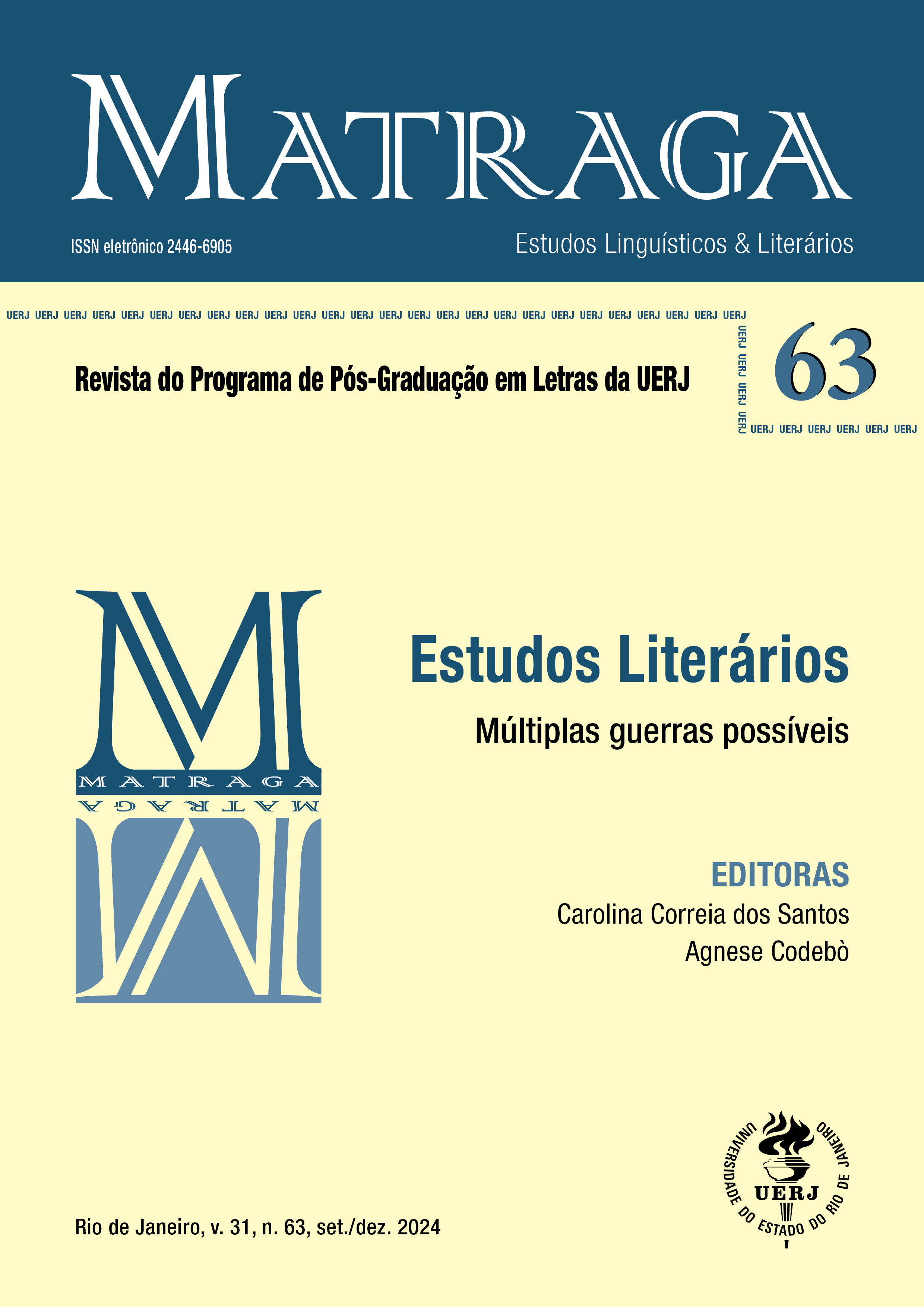War and aquatic imaginaries in Euclides da Cunha
DOI:
https://doi.org/10.12957/matraga.2024.86508Keywords:
War, Infrastructure, Water, Amazonia, Euclides da CunhaAbstract
This article discusses the relations between water, infrastructure and war in the work of the Brazilian writer Euclides da Cunha, with a particular emphasis on his Amazonian writings. The article argues that both water and war are key elements throughout Euclides’s work. Thus, it proposes that Rebellion in the Backlands [Os sertões] is not a book that deals solely with the Canudos War or about the Northeastern region known as the sertão, but that the aquatic imaginary plays a key role in it as well. Similarly, I argue that À margem da história [At the Margins of History] (1909) is not just about the rivers of the Amazon region, but that in the essays gathered in the book the notion of war adopts a key role. The article studies the multiple; though interconnected - meanings of the notion of war in these essays and shows how this presence grows throughout the different texts up to a point when Euclides seems to announce an imminent international conflict. In order to better highlight the importance of war and water in Os sertões and À margem da história, the article contrasts specific passages from both books; in this way, the strong continuities between the images used to narrate the sertão and those that appear in the description of the Amazon become clear. Finally, the article closes with the study of Euclides’s infrastructure projects regarding the construction of a railway and the use of paths known as “varadouros” to connect the various rivers of the Acre region, which complicate mobility, according to the engineer. I also discuss how Euclides reflects on the ways in which the river and the train could contribute to better wage war against the neighbouring countries.
Downloads
References
BECKMAN, Ericka. Capital Fictions: The Literature of Latin America’s Export Age. Minneapolis: University of Minnesota Press, 2013.
BERNUCCI, Leopoldo M. A imitação dos sentidos. Prógonos, contemporâneos e epígonos de Euclides da Cunha. São Paulo: Edusp, 1995.
BERNUCCI, Leopoldo M. “Prefácio”. In: Euclides da Cunha. Os sertões (Campanha de Canudos). Ed. Leo¬poldo M. Bernucci. São Paulo: Ateliê Editorial, 2001, pp. 13-49.
BERNUCCI, Leopoldo M. Paraíso suspeito: A voragem amazônica. São Paulo: Edusp, 2017. Trad. Geraldo Gerson de Souza.
BRAVEBOY-WAGNER, Jacqueline Anne. The Venezuela-Guyana Border Dispute: Britain’s Colonial Legacy in Latin America. New York: Routledge, 2019.
CARSE, Ashley. Beyond the Big Ditch: Politics, Ecology, and Infrastructure at the Panama Canal. Cambrid¬ge, MA: MIT Press, 2014.
CUNHA, Euclides da. Os sertões (Campanha de Canudos). Ed, Leopoldo M. Bernucci. São Paulo: Ateliê Editorial, 2001 [1902].
CUNHA, Euclides da. À margem da história. São Paulo: Martins Fontes, 1999 [1909].
DA SILVA PONTES, Kassius Diniz. Euclides da Cunha, o Itamaraty e a Amazônia. Brasília: Funag, 2005.
DE LA PEDRAJA, René. Wars of Latin America, 1899-1941. Jefferson, NC: McFarland & Company, 2006.
DELEUZE, Gilles y Félix Guattari. Mil mesetas: Capitalismo y esquizofrenia. Trad. José Vázquez Pérez. Va¬lencia: Pre-textos, 1997 [1980].
ESPINOZA CÁRDENAS, Freddy Orlando. La Vorágine de Euclides da Cunha: um livro de meu amigo men¬tal JoséEutasio Rivera. EDUA: Manaus, 2014.
FERNÁNDEZ BRAVO, Álvaro. “Territorios porosos: patrimonio natural y patrimonio cultural, perspectivas desde la literatura de viajes y el ensayo latinoamericano”. Revista de crítica literaria latinoamericana, 40: 79 (2014). 97- 120.
GÁRATE, Miriam. Civilização e barbárie n’Os sertões. Entre Domingo Faustino Sarmiento e Euclides da Cunha. São Paulo: Fapesp/Mercado de Letras, 2001.
HARDMAN, Francisco Foot. Trem fantasma: a modernidade na selva. São Paulo: Companhia das Letras, 1988.
HECHT, Susanna B. The Scramble for the Amazon and the “Lost Paradise” of Euclides da Cunha. Chicago: University of Chicago Press, 2013.
ISHMAEL, Odeen. The trail of diplomacy: the Guyana-Venezuela border issue. Volume one, Colonization, boundary dispute and arbitration. Odeen Ishmael, [Guyana?], 2013.
JOHNSON, Adriana Michèle Campos. “Infrastructure”. In: Handbook of Latin American Environmental Aesthetics. Ed. Jens Andermann, Gabriel Giorgi and Victoria Saramago. De Gruyter, 2023. 229-243.
LARKIN, Brian. “The Politics and Poetics of Infrastructure”. Annual Review of Anthropology. 2013. 42:327– 43.
LASSO, Marixa. Erased: The Untold Story of the Panama Canal. Cambridge, MA: Harvard University Press, 2019.
MARTÍNEZ-PINZÓN, Felipe. “La potencia bélica del clima: representaciones de la Amazonía en la Guerra con el Perú (1932-1934)”. En Felipe Martínez-Pinzón y Javier Uriarte, eds. Entre el humo y la niebla: Guerra y cultura en América Latina. Pittsburgh: Instituto Internacional de Literatura Iberoamericana, 2016. 217-242.
QUIN, Alejandro. “Rubber”. En Fernando Degiovanni y Javier Uriarte, eds. Latin American Literature in Transition, 1870-1930. Cambridge: Cambridge University Press, 2023. 15-29.
TORRES, Cinthya. “Contested Frontiers: Territory and Power in Euclides da Cunha’s Amazonian Texts”. En Martínez-Pinzón y Javier Uriarte, eds. Intimate Frontiers: A Literary Geography of the Amazon. Liverpool: Liverpool University Press, 2019. 67-87.
URIARTE, Javier. The Desertmakers: Travel, War, and the State in Latin America. New York: Routledge, 2020.
URIARTE, Javier. “Euclides da Cunha en la Amazonía: pensar el desplazamiento, controlar los espacios, anunciar la guerra”. Revista de crítica literaria latinoamericana. XLV: 90 (2019). 15-28.
Downloads
Published
How to Cite
Issue
Section
License

This work is licensed under a Creative Commons Attribution-NonCommercial 4.0 International License.
Authorization
Matraga – Scientific Journal of the Post-graduate Program in Arts and Humanities of UERJ is authorized to publish the article submitted here, if it is accepted for online publication. It is attested that the contribution is original, that it is not being submitted to another publisher for publication, and that this statement is the expression of truth.
The works published in Matraga's virtual space – Scientific Journal of the Post-graduate Program in Arts and Humanities of UERJ will be automatically transferred, and your copyright is reserved to Matraga. Its reproduction, in whole or in part, is conditional on the citation of the authors and the data of the publication.

Matraga uses license Creative Commons - Attribution-Non-Commercial 4.0 International.





